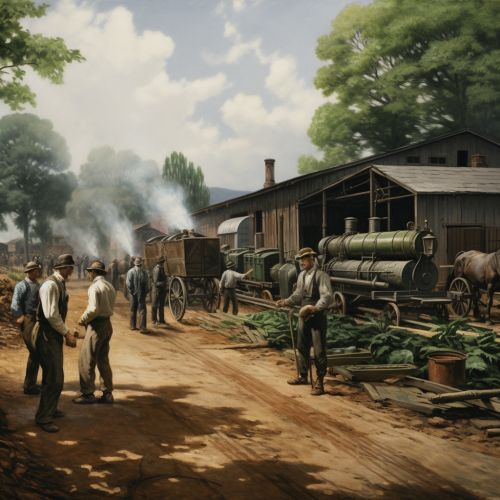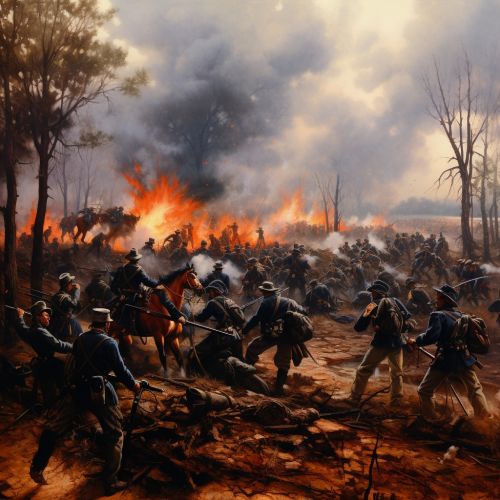American Civil War
Origins of the American Civil War
The origins of the American Civil War can be traced back to complex issues including economic disparities, political power struggles, and differing interpretations of the United States Constitution. The primary catalyst, however, was the contentious issue of slavery.
The economic differences between the industrial North and the agrarian South were stark. The North's economy was based on industry and commerce, while the South relied heavily on agriculture, particularly cotton, which was labor-intensive and depended on slave labor. These economic disparities led to disagreements over policies such as tariffs, which the industrial North favored but the agricultural South opposed.
Political power struggles also played a significant role. As new states were admitted to the Union, there was a constant battle over whether these states would be free or slave states, affecting the balance of power in Congress. The South feared that if the North gained a majority in Congress, it could pass laws detrimental to Southern interests, particularly regarding slavery.
The interpretation of the Constitution was another point of contention. The South argued for states' rights and believed that the federal government was overstepping its bounds, particularly with regard to slavery. The North, on the other hand, believed in a stronger federal government and saw slavery as a moral issue that needed to be addressed at the national level.


The Outbreak of War
The election of Abraham Lincoln in 1860 was the breaking point for many Southern states. Lincoln was a member of the Republican Party, which had a platform of restricting the expansion of slavery. Although Lincoln stated he had no intention of abolishing slavery where it already existed, his election led seven Southern states to secede from the Union, forming the Confederate States of America.
The war officially began on April 12, 1861, when Confederate forces attacked Fort Sumter, a Union fort in South Carolina. The attack on Fort Sumter was the first military action of the war and marked the beginning of four years of intense conflict.
Major Battles and Events
The American Civil War was marked by numerous major battles and events. Some of the most significant include the First Battle of Bull Run, the Battle of Antietam, the Battle of Gettysburg, and the Siege of Vicksburg. Each of these battles had a significant impact on the course of the war and the morale of both the Union and Confederate forces.
The First Battle of Bull Run, also known as the First Battle of Manassas, was the first major battle of the Civil War. It took place on July 21, 1861, in Virginia. The battle was a Confederate victory and gave the South a significant boost in morale.
The Battle of Antietam, also known as the Battle of Sharpsburg, was the bloodiest single-day battle in American history, with over 22,000 casualties. It took place on September 17, 1862, in Maryland. The battle ended in a tactical draw but was considered a strategic victory for the Union as it halted the Confederate invasion of the North.
The Battle of Gettysburg, fought from July 1 to 3, 1863, in Pennsylvania, was the war's turning point. The Union victory ended Confederate General Robert E. Lee's second invasion of the North and marked the beginning of a steady decline in Southern morale and military capacity.
The Siege of Vicksburg, from May 18 to July 4, 1863, in Mississippi, was another significant Union victory. The capture of Vicksburg gave the Union control of the Mississippi River, effectively splitting the Confederacy in two and disrupting its supply lines.


The End of the War and its Aftermath
The American Civil War officially ended on April 9, 1865, when Confederate General Robert E. Lee surrendered to Union General Ulysses S. Grant at Appomattox Court House, Virginia. However, the aftermath of the war was a long and difficult process.
The period known as Reconstruction followed the war, during which the Southern states were readmitted to the Union and constitutional amendments were passed to protect the rights of former slaves. However, the process was fraught with challenges, including political disputes, economic struggles, and widespread racial violence.
The war had a profound impact on the United States, leading to significant changes in the nation's political, social, and economic structures. It resulted in the abolition of slavery, the strengthening of federal power, and the modernization of the economy. However, it also left a legacy of racial tension and regional division that continues to shape American society and politics.


